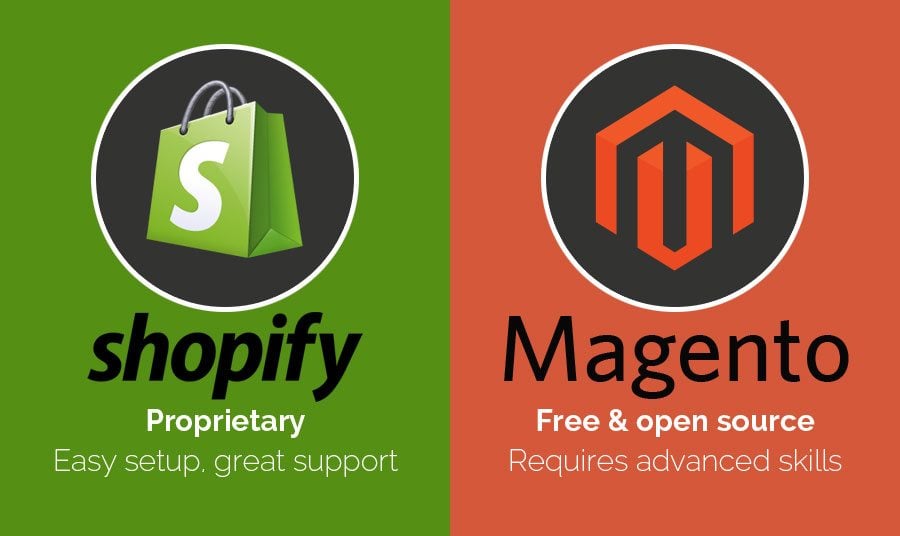The TemplateMonster blog has received a number of questions about Shopify and Magento platforms. Guys wanted to know how these platforms differ, what they have in common, and which of these two would be the best solution for their stores. So, we decided to give you a comparison of these eCommerce platforms, thus let you know which of them is the best for your personal store.
It’s all about your skills, actually. If you feel at ease while coding, then you will have no difficulties with Magento. This platform requires much knowledge from its user. But if you need something that will not burden you, Shopify will be the best possible option.
Let’s have a look at the basic differences and similarities between these two platforms. See the table below:
|
SHOPIFY |
MAGENTO |
|
Proprietary |
Free & open source |
|
Easy setup, great support |
Requires advanced skills |
|
Wide customization options |
Extremely customizable |
|
Number of App available, to extend your store’s abilities |
Great amount of community developers as well as extension companies |
|
Best for small stores |
Best for large online sellers |
|
Pricing starts at $14/month |
Free |
|
Dedicated hosting is not required |
Requires dedicated hosting server specializing in Magento |
|
One storefront available |
Multiple storefronts on one platform |
|
Configure apps within admin panel |
Integrate extensions into Magento Admin |
|
Products are organized via tags |
Hierarchical structure of products (categories and subcategories) |
If you are still hesitant about which of these to choose, let’s continue our comparison.
Shopify stands for all-in-one solution. There is no need for you to buy some additional whatsis for your store. When you enroll for the trial within Shopify, you will get a fully functional store to try for 14 days. During this period you’ll be able to test all the features and decide for yourself if this platform is the one you need.
Now let’s look at pros and cons of these two platforms and let’s start from Magento.
Magento
In the world of eCommerce Magento is the king. Brands like Nike, Northface run their sites on this platform. Magento Go, the hosted solution, is coupled with Shopify and BigCommerce. As for the visuals, you’ll be able to find free or premium templates. Free templates are not advised, as a rule they are quite limited in terms of design elements. As for the premium, you can check out the gallery to find out how Magento templates look like.
If you have already visited Magento site, than you’ve seen that this platform is available in a number of versions. The most profound - Enterprise - is created for developers. The price actually bites.
- $12,990 for production server #1
- $12,990 for production server #2 (added for redundancy and speed)
- $0 for 1 staging server, $12,990 for any additional
- $25,980 per developer
Pros:
- Most advanced and comprehensive eCommerce platform.
- Huge amount of templates.
- Countless amount of features.
- Third-party apps and plugins available (both free & premium).
Cons:
- Extensive knowledge needed for anyone to use this platform.
- Magento is not user friendly to a non-technical person.
- Documentation is mostly online, support options are quite limited.
Shopify
This is one of the easiest eCommerce platforms one can use. With Shopify you’ll be able to start your store in a few days after you’ve registered. Using this platform there will be no necessity to code. Just pick the template you like and “fill in the blanks” with your content.
Advantages:
- User-friendly.
- Just a few customizations needed to launch a store.
- Affordable (starts from $14), great support on board.
- Number of APPs available.
- POS.
Drawbacks:
- Limited customization option.
- Limited template library.
- Limited reporting option.
